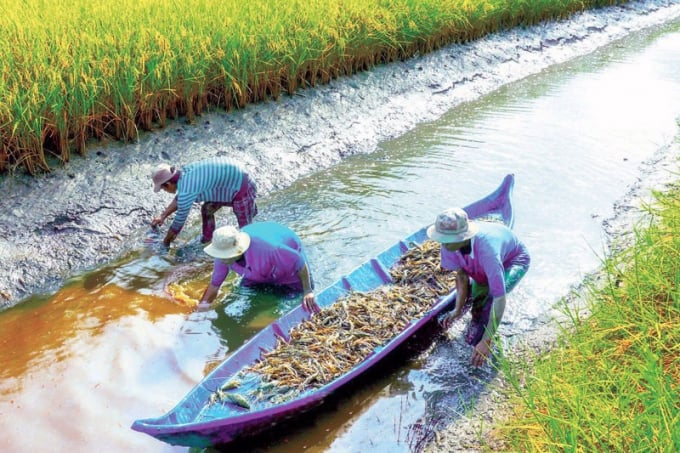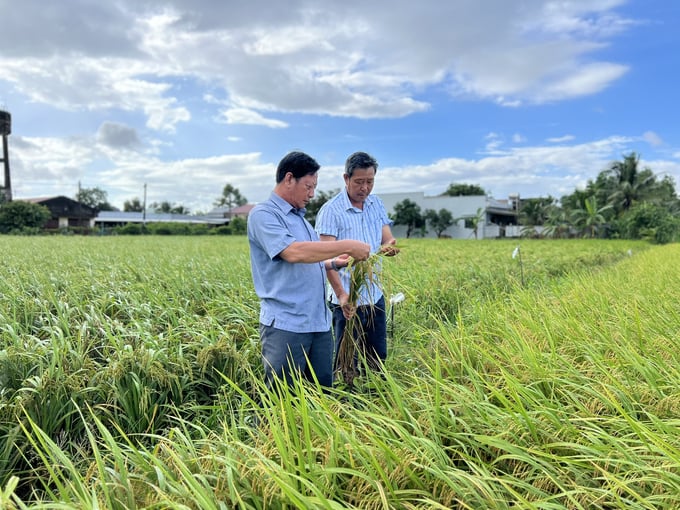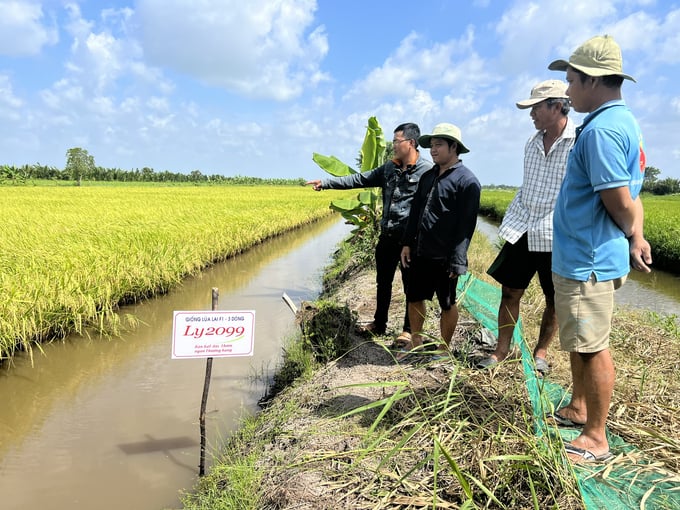May 21, 2025 | 04:50 GMT +7
May 21, 2025 | 04:50 GMT +7
Hotline: 0913.378.918
May 21, 2025 | 04:50 GMT +7
Hotline: 0913.378.918
Promoting the development of organic agriculture is Bac Lieu’s primary orientation at present as it is considered one of the key tasks. The local agriculture sector is focusing on guiding farmers to produce in a safe direction, thereby limiting the use of antibiotics, chemicals, growth stimulants, inorganic fertilizers, and pesticides of toxic origin. In particular, the province is implementing two groups of organic production models.

Bac Lieu aims to make the most of the "fragrant rice - clean shrimp" value chain. Photo: TL.
Regarding aquaculture, local authorities encourage farmers to use probiotics in order to better manage the environment, use disease-free breeds at appropriate densities and stock a variety of fish species in consideration of water treatment matters, and develop ecological aquaculture models towards organic production and sustainability.
The model “improved extensive aquaculture in coastal mangrove forests” is a mentionable example. It has a total production area of 75,000 ha, in which the shrimp - rice farming area occupies 40,000 ha. Farming models such as this one have affirmed sustainability and efficiency which is reflected in product quality. The shrimp - rice model is highly appreciated by domestic and foreign scientists as it shows profits 15 - 30% higher than rice monoculture models.
As for the field of cultivation, Bac Lieu has implemented the model "building community organizations through smart rice farming cooperatives and cooperative groups in the direction of organic production, applying mechanization, adapting to climate change, and establishing linkage for product consumption" on an area of 300 ha. The model uses certified rice varieties, promotes the use of organic fertilizers along with biological pesticides. Profits from the model are VND 20 - 25 million/ha higher than the conventional farming model.
Hoa Binh in particular has applied a rice production model with increased organic fertilizers and reduced inorganic fertilizers for specialized areas producing rice 2-3 crops per year. The model has helped farmers reduce the amount of seeds sown as well as the amount of inorganic fertilizer used by 10 - 15% while supplementing organic fertilizers and prioritizing pesticides of biological origin. This results in quality and safe products which can be sold at a high price. Farmers participating in the model feel satisfied because the profit increased by over VND 19 million/ha.

Bac Lieu's organic rice production models have helped farmers reduce costs, increase profits, and improve the ecological environment. Photo: Trong Linh.
Farmers are also encouraged to use certified rice varieties while applying "3 decreases, 3 increases", "1 must, 5 decreases", and integrated pest management (IPM) program, thereby improving product quality, protecting the environment and ensuring food safety for consumers.
Luu Hoang Ly, Director of Bac Lieu Department of Agriculture and Rural Development, said that in order to successfully achieve the goals of the organic agriculture development scheme on the basis of effectively promoting local potentials and advantages, the province’s agricultural sector will further invest in renovating and upgrading transport, irrigation, and electricity infrastructures for production sub-regions.
Accordingly, priority will be given to small and medium dike areas. Irrigation systems and electric pumping stations will receive maintenance and upgrades to ensure flexible and timely water supply, drainage and storage of salt and fresh water in the direction of biosafety and high technology application.
The local authorities will continue to support brand building, gradually develop the shrimp-rice product brand and create a breakthrough for Bac Lieu's BL9 rice variety, direct the replication of high-quality rice varieties that are tolerant to alum, salinity, and have good pest resistance (ST24, ST25, Mot Bui Do, etc.) in localities as a way to promote organic production associated with the issuance of growing area codes and farming facility codes to perform traceability.

The shrimp - rice model in Phuoc Long district, Bac Lieu province. Photo: Trong Linh.
On the other hand, the agriculture sector of Bac Lieu province plans to accelerate the construction of an agricultural park that applies high technology to deploy smart shrimp farming, ensure biosafety and integrate digital technology. The local authorities support the establishment and consolidation of cooperatives so that they have enough capacity to organize production in a sustainable and effective manner.
Bac Lieu’s current objective is to improve the financial capacity of cooperatives and cooperative groups through credit policies in service of local agricultural and rural development according to regulations. In particular, the province focuses on promoting the development of organic agriculture and developing strategies to attract businesses.
Translated by Samuel Pham

(VAN) Japan's grant aid project contributes to capacity building, promoting organic agricultural production, and fostering sustainable community development in Dong Thap province.

(VAN) For years, the CRISPR-Cas9 genome technology has been reshaping genetic engineering, a precision tool to transform everything from agriculture to medicine.

(VAN) Vietnam aims to become a 'leader' in the region in the capacity and managing effectively soil health and crop nutrition.
![Reducing emissions from rice fields: [Part 1] Farming clean rice together](https://t.ex-cdn.com/nongnghiepmoitruong.vn/608w/files/news/2025/05/05/z6509661417740_a647202949c539012a959e841c03e1d3-nongnghiep-143611.jpg)
(VAN) Growing clean rice helps reduce environmental pollution while increasing income, allowing farmers to feel secure in production and remain committed to their fields for the long term.
/2025/05/19/5136-1-144800_230.jpg)
(VAN) The Nghe An Provincial People's Committee has just approved the list of beneficiaries eligible for revenue from the Emission Reductions Payment Agreement (ERPA) in the North Central region for the year 2025.

(VAN) 14 out of 35 domesticated elephants in Dak Lak province have had their living conditions improved, with 11 of them currently participating in the non-riding elephant tourism model.

(VAN) Muong Nhe Nature Reserve hopes that being upgraded to a national park will lay the foundation for forest protection efforts to be carried out in a systematic, modern, and sustainable manner.